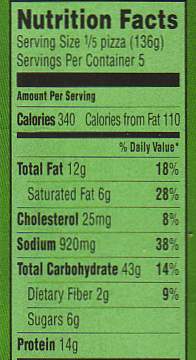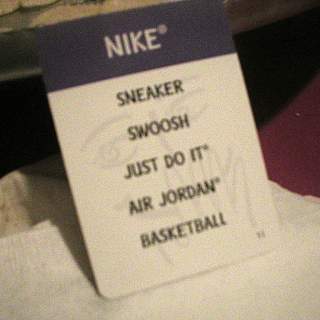| Although not based on a televised advertisement, I think the following is still a fairly rampant example of unscrupulous marketing: Most moderately sized edible things will claim at least four servings to a container and then reduce the fat, sodium and calorie point totals to a fraction of what they actually would be if you consumed the total contents, which it is assumable that many people do. A perfect example are Freschetta's frozen sauce-stuffed-crust pizzas. 920 millograms of sodium they contain, which is half or less than that of many Hungry Man XXL offerings, widely regarded as the worst possible things you can eat {if you try}... or is it? Servings per container: 5. Freschetta's 920x5=4600 (it's all right, I'll wait while you type that into your calculator) is equal to or more than that of its colleaugue, and I still feel like I could eat another pizza afterwards. I'll usually coat one in a layer of whatever fried and breaded bite-sized horrors cohabitating my freezer unit at the moment more plausibly state an odd number of servings. Again, that's 5, for the one pizza. I shouldn't be surprised, right there on the front of the box, almost proudly displayed, is “serves five.” Nevermind what a horrid, unfeasible lie that is; when I bother to, I cut the pizza into eighths, just like 98% of pizzas I've ever seen, so unless Freschetta assumes that 3 of my hypothetical group want two slices and 2 only desire one, this box sincerely suggests cutting the barely-medium sized disk into ten slices and... have you ever tried to do that? You'd cut it in half and then have to make eight more cuts to seperate each tiny, individual piece and additionally make sure that they're all even so that no one complains. That's enough extra effort that you'd have an easier time clobbering out diner number five for the duration of the meal and justifying your actions afterwards. Fortunately, you wouldn't really do that, and Freschetta doesn't really believe you will, because they only make such a claim as an excuse to divide some very big numbers and hide the fact that they're selling a thing every bit as anti-nutritious as a product that some speculate is little more than solid lard. I like to think the pizzas taste better, though. It's pretty hard to excuse myself for continuing to eat them, otherwise. | 
Luckily I have my gram scale right here.

...munchkins.
|
|


